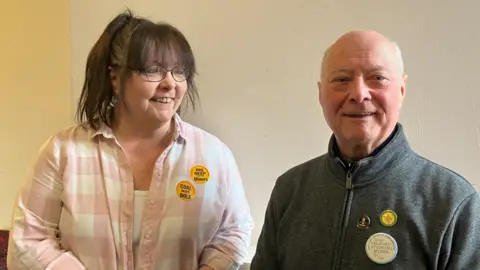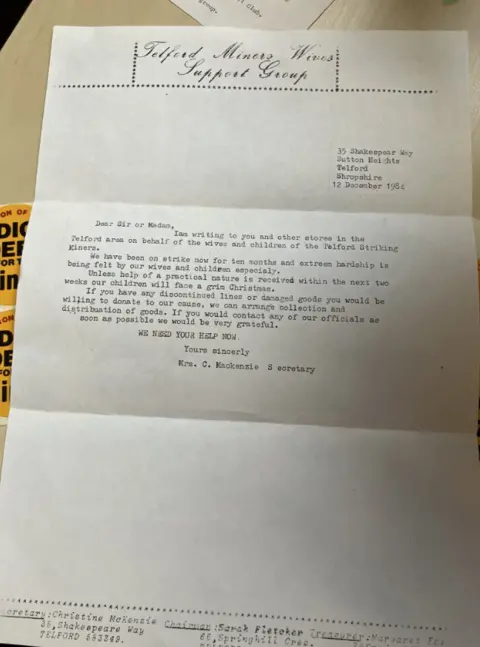Miners' strike: The Telford Dozen who held out
 BBC
BBCA former miner who was on strike for the whole of the miners' strike in 1984 -85 said there was still life left in most collieries at the time and the miners were striking for the future.
The biggest industrial dispute in post-war Britain saw thousands of miners and their trade union against then prime minister Margaret Thatcher and her Conservative government.
Alan McKenzie was one of the so-called Telford Dozen in Shropshire, a group of 13 miners who stuck with the strike until the end.
The 74-year-old, from Madeley, said while the strike was tough, the miners had great support from local businesses and organisations.
Mr McKenzie, who started as a miner in 1965 on an apprenticeship and worked underground for 28 years, said he loved the job because of the comradeship.
About three-quarters of the country's 187,000 miners went on strike to oppose the pit closures, which were expected to mean 20,000 job losses.
Thousands of officers were drafted in to police the picket lines, with violence breaking out at times.
The miners' eventual defeat was the end of an era for Britain's trade union movement and helped cement Mrs Thatcher's reputation as the Iron Lady.
- Miners' strike 1984: Why UK miners walked out and how it ended
- Miners' Strike: A Frontline Story
- The Miners' Strike: Return Journey
The strike happened when Mr McKenzie's daughter, Carrie, was eight years old.
She told BBC Radio Shropshire of her first memory of the strike, when her parents explained the situation to her and her brother.
"They were obviously explaining it in a very childlike way but they explained that dad wouldn't be working," she said.
"So we'd be very tight for money, there wouldn't be any new clothes, Christmas was likely to be difficult.
"I remember dad explaining that it was important because it wasn't going to stop at the miners, it was going to be other services, other industries, so it was really important to make this stand.
"I suppose it was my first lesson really in standing up for what you believe."
Ms McKenzie said the most upsetting moment from the strike for her was when she was at Brownies and an adult told her she would not be able to afford to go to Brownie camp.
However Mr McKenzie went to her group the next week with the payment in full, and said: "My daughter will be going on the summer camp."

Ms McKenzie, who went to school with a "Coal Not Dole" badge on her coat, said: "I was aware there were some people that weren't supporting the miners. There was obviously a lot of judgement.
"But then that Christmas, we weren't expecting anything. And through the generosity of the local people, it was probably the best Christmas that we've ever experienced."
On Christmas Eve 1984, the family said they received a mysterious phone call which said: "You need to go to the front door, there's a parcel."
While the donor of the package never revealed who they were, Mr McKenzie thanked them for their generosity in the Shropshire Star newspaper.
While he acknowledged that people spoke of animosity after the strike ended, Mr McKenzie told how a group of miners reacted after a fatal incident.
He said the miners in the pit were told that any of the Telford Dozen should get up to the bank as "it's one of your mates".
"It was a lad that was on strike with us," he said.
"They had three lads working on him mouth-to-mouth and it went on above an hour - they never gave up.
"It changed my view of them because they used to play about a bit but they did the job that day - unfortunately they couldn't help, but they never gave up.
"So this thing about animosity after - there was a little bit - but when you're down there, you all work together, and that's what it was about."
Follow BBC West Midlands on Facebook, X and Instagram. Send your story ideas to: [email protected]
